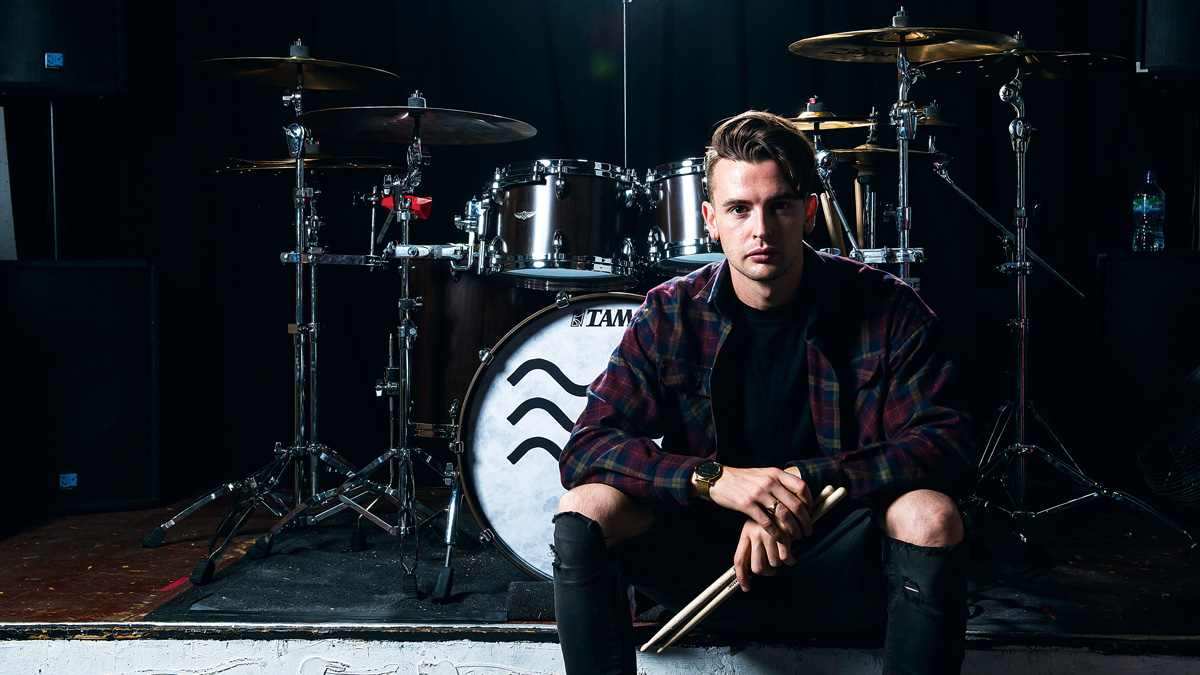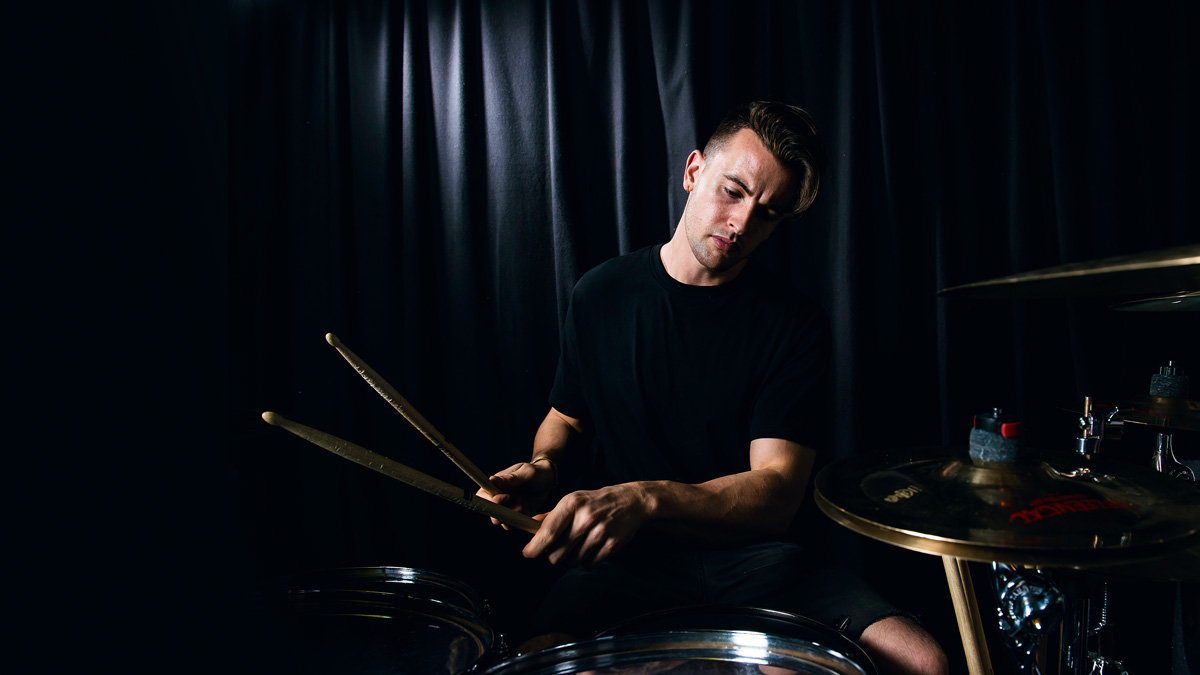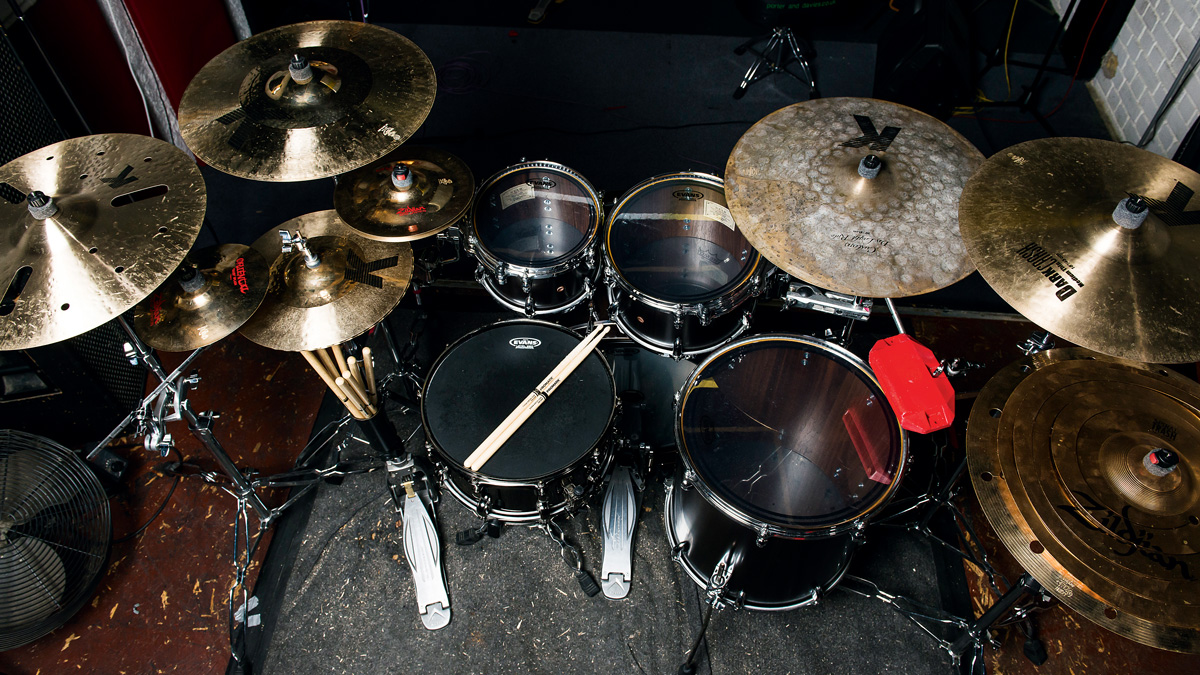Eddy Thrower talks becoming a UK drum hero, One Direction pop sessions and the evolution of Lower Than Atlantis
Plus the inside word on the brand new LTA record

Making a drum hero
Every now and then, a player comes along who personifies what it means to be a drummer at that particular time in music.
In 2017, that’s Eddy Thrower. The young Lower Than Atlantis drummer has everything - image, power, chops and groove, while his band have made a quantum leap from hard-edged punk rock to mainstream success - whether you define that by sell-out live shows, radio-plays, album sales, single downloads or a gazillion streams. At the same time, the band’s work ethic, song-writing nouse, skilled musicianship and exciting live act recall great bands from any generation since the birth of hard rock.
As the band prepare to hit us for six with a new album, Safe In Sound, due in February, and their biggest UK tour to date the following month, Rhythm spoke to Eddy about his approach to playing, learning and above all enjoying the drums.
How did you first hook up with Lower Than Atlantis?
"I started a band in my home town of Winchester, and during that time I got introduced to Dec who now plays bass in Lower Than Atlantis. We started a band called We Stare At Mirrors - it was kind of a heavy hardcore band and actually our first show was with Architects. That was going really well, then we did a mini-tour around the UK, I think it was three or four shows with LTA, with their old members. We were chatting to Mike [Duce, LTA frontman] and Ben [Sansom, guitar] and got on really well, and then I think it was a month or two later, Mike messaged me on Facebook and called me and said, ‘Hey do you want to come try out? We’ve obviously seen you play and we think you’re wicked, and we got on with you, come out - our drummer’s just left.’
“And I was like, do you know what? I think I will, ’cos the band that I was in, I wasn’t really happy being in that band, so I went there and got the gig straight away. At that time LTA weren’t really doing anything, that whole tour I think there were like 40 people showing up, and there were four bands on the tour! So I joined the band and then shortly after recorded our first album Far Q, and from that point on we all quit our jobs and went for it. Just after Far Q was released, Ben’s brother, who played bass in the band at the time, left and I said to Dec [Hart], mate do you want to do it? Me and Dec merged into LTA and from that moment on we took things really seriously and went for it.”
I joined the band and then shortly after recorded our first album Far Q, and from that point on we all quit our jobs and went for it.
Far Q was great but it’s quite hardcore, was it a conscious move to a more accessible sound on the following albums?
“I think for us, we all listen to loads of different music all the time, not just punk or hardcore bands, music in general. Whatever it is if it’s good we’ll listen to it. It wasn’t a purposeful thing to just become lighter: ‘Oh we want to get bigger and therefore we have to play lighter music because there are loads of big bands that play really heavy music...’ Honestly we just all listen to so much music it was just a natural thing and it’s been that way ever since. For me, I’ve always said it, if you can predict what the band are gonna do and what the album sounds like it’s not worth doing.”
Has that more melodic, pop element affected how you approach the drum parts now?
“It definitely made me play less, I think that was inevitable really. Back in the day that wouldn’t have worked, you recorded and just did whatever and then the more people you work with, decent people you work with who are actually doing stuff that sells a lot of records, you definitely learn stuff and you learn a lot quickly about what to play and what not to play.
“And most of the time it’s important what you’re not playing, it’s all about the vocal melody and stuff like that. I enjoy coming up with a good idea that’s simple that translates across the whole world, that any non-drummer can pick up. That’s why I think Lars is so good, he does fills that drummers will go, ‘Oh, that’s a rubbish fill, it’s boring,’ but then you’ve got 50,000 people in the audience air-drumming it because it translates! I still keep elements in LTA that are for the drummers out there but I like to try and make it a little bit more digestible for the people that aren’t necessarily into rock music.”
I’m quite geeky, I’m quite a gear-head. I’m quite hands-on with it. I’m the classic drummer, when a mix comes back I’m that kind of guy where I just listen to the drums!
How geeky are you when it comes to drum gear and getting the right drum sound?
“I’m quite geeky, I’m quite a gear-head. I’m quite hands-on with it. I’m the classic drummer, when a mix comes back I’m that kind of guy where I just listen to the drums! But I’m quite hands-on. For the most part 8 out of 10 people won’t notice the difference between a 20" and 16" EFX, but for me I do, and it’s the little things I care about, man, I’m quite hands-on and geeky when it comes to that.”
Are you conscious when writing with LTA of performing the songs live?
“We want to the songs to translate in big venues now, and for them to sound good in big venues, as well as a lot of the stuff like tempos and dynamics. But we’ve found what works for us now. That’s quite a hard one, I hadn’t thought about that much to be honest but sometimes when we’re writing a song and we’re trying to get a tempo, we jump up and down in the studio looking like absolute idiots - [to find out] whether people can jump around to it, how fast it needs to be. So I guess we do think about it when we’re jumping up and down in the studio!”
Do you ever come up with tricky parts in the studio and then think, ah, now I’ve got to play this live?
“That happens quite a lot actually because it goes back to what I said about a non-drummer programming drums and saying, ‘Can’t you do this?’ And I’m like, well it could work but give me a second to figure out how I’m going to be able do that! There’s a few songs I’ve been like, ‘Oh flippin’ heck, why have I done that?’ Because now I’m going to have to do that live and that’s really stressful! But I think that’s good though, it means I’m constantly pushing myself and learning new things.
“I think especially when you’ve been playing an instrument for so long and you’ve been in a band for so long, any time anyone can put the pressure on me and ask me to do something I can’t do, but record it now and then play it in front of thousands of people, I love it! It’s all about chucking yourself in the deep end... then getting yourself out as quickly as possible!”

Pop sessioneer
You’ve also done sessions for One Direction and 5 Seconds of Summer - tell us how those came about.
“That came from working with producers on the self-titled album, we asked various different people to record demos, and a particular producer called Steve Robson had us in and we worked on a song called Criminal which was on the last album, and I literally just said to him after the session, ‘Mate, if you ever need a drummer for anything just give us a shout,’ because he was a lovely guy, he knew his s**t.
“You walk in his studio and there’s plaques of everyone you could possibly imagine on his wall, but for me it was just like stepping into this other world! We’re a rock band who started off playing in front of two people and being poor, our whole team, and it was difficult - so stepping into a world where you’re seeing platinum discs from Robbie Williams and Take That, you’re like, ‘This is how the other half lives, this is pretty cool!’
“So I just said to him give us a shout, then didn’t really think anything of it, then a couple of months later he dropped me an email and said, ‘Can you come in?’ and that was it - it was pretty simple really. It was just all about trying to keep a friendship and a communication there really and hoping for the best, and that he liked my playing - and I think he did, so it was cool.”
The UK drum community has never been stronger. Everyone helps each other out...
You’ve been getting involved in drum education yourself, doing loads of masterclasses - you were fantastic at the London Drum Show back in November...
“Even after the London Drum Show, Tuesday I had another masterclass, Wednesday another... and I’ve got a few next week as well. I’m not going to lie, they are quite daunting, and I’m getting better at them but for me I hate speaking in public and that’s one thing I’m going to have to get better at. But I love just hearing what questions these kids have got. When I was younger I didn’t really know about clinics and masterclasses, to be honest - if I did I would definitely have been at every single one I could. I love them.”
You’ve become something of a role-model and ambassador for UK drumming - have you found the UK drum community’s been really supportive of you coming up?
“The UK drum community has never been stronger. Everyone helps each other out, with positive and creative collaborations happening all the time – sheds, videos, clinics and events like the London Drum Show. As clichéd as it sounds, it’s an ever-growing family, which is real cool. Everyone wants the same goal, everyone just wants to play drums and be successful. Everyone should help and support each other as much as possible. It’s really cool to be a part of and I feel very fortunate.”

Fresh beats
How do you go about keeping your drumming fresh and learning new things, particularly if you find you’ve hit a wall and you’re not enjoying your practice?
“It varies really but if I see a video on Instagram, for example, and he did this fill round the kit and I’m like, ‘I’ve never seen that before,’ I’ll keep that in my brain or I’ll make a note on my phone and next time I go into a studio I’ll try and recreate that. So that’s one thing. The other thing is rudiments, they’re really important. For me I’ve got a really short attention span and it was really hard for me to sit down and be studious for any length of time, so sitting down with a practice pad in front of me doesn’t work for me. I like to take a rudiment, say a paradiddle, and keep that in my head at all times. And being a drummer I tap on everything anyway, but instead of tapping something random, for example I’ll tap on the steering wheel at the traffic lights, or on my lap - tap it out and subconsciously you’ll pick it up way quicker without really realising you’re practising. It eliminates that whole boredom and stress because you’re not really practising it, you’re just subconsciously tapping away here and there for short periods throughout the day for a few days - then when you sit at a drum kit or practice pad, bang, you’ve got it.
“What I try to do as well is film stuff straight away, so I get my GoPro out, film it and watch it back and push myself that way. I have an end goal. I think a lot of people get put off learning because they go, ‘I could learn that but then what’s going to come of it?’ For me if I want to learn a paradiddle I try and learn it and then I’ll pop my GoPro out and I’ll say, my end goal is I want to put a video in Instagram which will go down well. So therefore I have to play that paradiddle constantly, play it really cool, around the kit, film it, bang, done, move on to the next.”
I started getting into gospel drumming, the whole linear sort of thing, and when everyone hears the album, especially if they’re into drums, they’ll be able to hear that.
And how about those times you maybe hit a wall in your development, how do you overcome that?
“Constantly having the thought in my head that this is what I want to do. From such an early age, I was always playing drums, always, always, always. Wanting to be a drummer. My parents used to always take us to Florida on holiday, and they used to drop me off at Sam Ash and Guitar Center and pick me up in seven hours, because all I wanted to do is play the electric drum kit. I never really realised I was good or even bad, that wasn’t in my head, I just loved playing drums. I never kind of had the, ‘Oh I’m not playing well,’ or whatever, especially when I was younger, it never really occurred to me. Nowadays I get a bit, ‘Oh why can’t I do that?’ and it annoys me. But I never really hit a wall, where I had no motivation, to be honest.”
How do you keep your own drumming fresh?
“I think by learning other styles of drumming and being able to put that into LTA, especially on the new album. I started getting into gospel drumming, the whole linear sort of thing, and when everyone hears the album, especially if they’re into drums, they’ll be able to hear that. So that’s how I like to keep it fresh, learning different styles, getting into different drummers who are completely different to you.”
Eddy's kit - Drums
Drum Tama Starclassic Walnut: 10"x8", 12"x9", 16"x16" and 22"x16", 14"x6" SLP brass snare.
Cymbals
Zildjian: 8" Oriental splash, 14" limited edition K Reversible hi-hats, 18" K Trash Smash crash, 18" K EFX crash, 10" K splash with a 10" Mini oriental china on top, 20" K Dark ride, 19" K Dark crash, 20" S Series EFT crash with a 20" spiral stacker on top, 18" K Custom Hybrid crash.
Plus
All Tama hardware, Evans EC2 Clear heads, Evans Hydraulic Black Head (snare), ProMark 5B drumsticks.